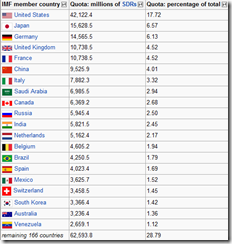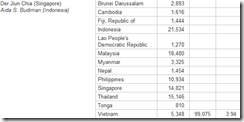From the Daily Mail,
Christine Lagarde, the managing director of the IMF, said the current war chest of around £250billion ‘pales in comparison with the potential financing needs of vulnerable countries’ and needs to be expanded to deal with ‘worst-case scenarios’.
Sources in Washington said the IMF’s pot of cash could be expanded to £2.6trillion although officials in London said that figure looked ‘incredibly high’.
Mrs Lagarde’s warning came as U.S. President Barack Obama said the debt crisis in Europe was ‘scaring the world’ and that eurozone leaders were not dealing with the issue quickly enough.
And a top Bank of England economist urged leaders around the world to stop the world plunging back into recession. ‘It’s doing something rather than just saying something that counts,’ said Ben Broadbent, a member of the Bank of England’s Monetary Policy Committee charged with setting UK interest rates.
Danger: U.S. President Barack Obama said the debt crisis in Europe was 'scaring the world'
Britain is liable for 4.5 per cent of IMF funding – meaning it would have to contribute around £115billion to an enlarged bailout fund, or £4,600 per household.
It is conceivable that figure may turn out to be slightly lower because Britain’s share is falling as rapidly growing economies such as China contribute more.
Britain has already handed over £12.5billion in emergency loans to Greece, Ireland and Portugal to help prop up the euro.
The staggering rescue package proposed by the IMF signify that the rest of the world will be included. This would be led by the United States which reinforces their backdoor participation (aside from the monetary channels).
(Wikipedia.org: IMF)
And the proposed bailout implies of the inclusion of ASEAN and the Philippines with 3.94% voting share.
IMF: IMF Executive Directors and Voting Power
Yet such humongous bailout scheme, if it does become a reality, would adversely impact global economic growth as resources are shifted from productive use towards saving the skins of Euro bankers and the political class. Filipinos will pay for this with higher taxes or inflation.
Moreover, there are no guarantees that shock and awe bailout tactics will work over the medium term or the long term. Just look at what has been happening to the US, whose economy continues to flag despite the trillions of dollars expended by the US Federal Reserve and the US government.
Also, by funneling large amounts of resources to current rescue programs, the world would have depleted or drained their resources should another crisis arise anytime.
Lastly, the use of scare tactics to secure political deals, seem to be acknowledged by politicians. Except that for some, they pretend to fight them, when they in truth—they have impliedly been promoting them.



